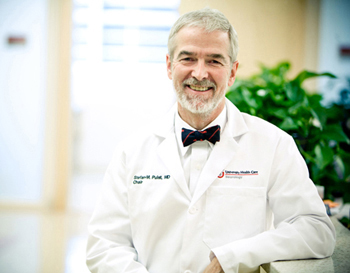Stefan-M. Pulst
E-mail:
Education:
M.D. 1979, Medizinische Hochschule Hannover; Clinical Fellowship, 1981-1983, Harvard Medical School; Postdoctoral Fellowship, 1984-1986, University of California, San Francisco
RESEARCH:
Mechanisms of neuronal degeneration using molecular and cellular approaches as well as studies in behaving animals.
We are investigating the mechanisms of adult-onset neurodegeneration. Our studies usually begin with genetic analysis of human pedigrees followed by modeling the disease process in cultured cells or by introducing mutations into model systems. Our focus has been on the spinocerebellar ataxias esp. SCA2, which is caused by expansion of a polyglutamine domain in ATXN2, and amyotrophic lateral sclerosis/FTD.
Our laboratory has studied mechanisms of neurodegeneration using a variety of techniques and in a number of model organisms. We are currently examining how the RNA-binding proteins ATXN2 and STAUFEN-1 modify autophagy and the UPR under conditions of chronic stress. For these studies, we are using a genetic interaction approach crossing lines deficient for target genes with mouse models of SCA2 or ALS. This is followed by morphologic, physiologic, and transcriptomics analyses and behavioral testing.
In addition to mechanistic investigations, other members of the laboratory focus on translational neuroscience and the discovery of compounds and biologicals to target ATXN2- and STAU1-mediated neurotoxicity. We are using high-throughput cell-based screening to identify compounds that down-regulate expression or stability of mutant proteins as well as using gapmer antisense oligonucleotides and artificial microRNAs.
Other projects involve identifying the gene responsible for the shaker phenotype in the rat and the gene for SCA4, an ataxia prevalent in Utah that was mapped to human 16q in 1996, but has eluded gene identification for nearly 30 years.
We are enthusiastic about students joining our groups either for rotations or for longer terms and can promise exposure to neurodegeneration from molecules to man.

